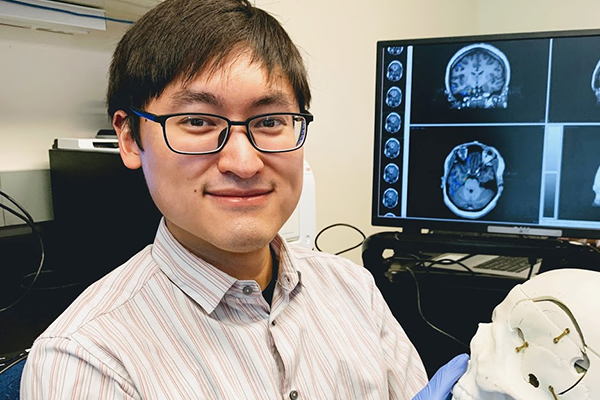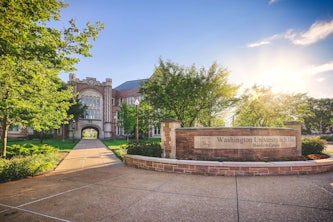Alumnus Wang joins community of accomplished scholars as a Hertz Fellow
Alumnus Maxwell Wang, who was recently named a Hertz Fellow, credits the community of mentors he’s met throughout his research career with helping him to become the accomplished scholar he is today

A good researcher knows the importance of networking and developing relationships with mentors. Maxwell Wang, who earned a bachelor’s degree in electrical engineering in 2016, learned this lesson earlier than most.
While in elementary school, he would sit in on classes at his local community college and flip through mathematics textbooks.
"Eventually, I began to meet helpful mentors who helped guide me to the next path, and I soon started taking courses at the University of Illinois at Urbana-Champaign," he said.
This path would take him from studying calculus and applied mathematics as a fifth grader to one of the most prestigious fellowships in the engineering field.
In May, Wang was named one of the 16 recipients of the 2020 Hertz Fellowship. For more than 57 years, the Fannie and John Hertz Foundation has supported the research of doctoral students who "demonstrate the greatest potential to tackle the most urgent problems facing society."
Wang was honored for his work studying the mechanics of the brain to better personalize treatments for conditions such as depression and Parkinson's disease.
According to Wang, current treatments for these conditions involve a lot of trial and error, with patients going through years of alternating diagnoses before finding a therapy that works.
"My goal is to figure out how can we understand what is fundamentally going on in the brain when patients have these diseases and what changes occur when we apply a treatment," he said. "Instead of trial and error, can we look at a brain beforehand and decide which treatment is going to work and how can we tailor treatments for specific patients?"
Wang credits his passion for studying the brain to another inspiring mentor. The former Langsdorf Scholar had originally planned to study robotics at the engineering school at WashU. He changed course after taking a class with ShiNung Ching, associate professor in the Preston M. Green Department of Electrical & Systems Engineering. Ching's research interests include systems and control engineering and neural medicine.
"Prior to him, my experience was primarily in the engineering domain," Wang said. "It was exciting to see how the very practical concepts we talk about in engineering can be applied to discover new and exciting knowledge, especially about the brain."
Wang's previous research experience was mostly unmanned aerial vehicles and image processing.
"Being exposed to how little we know about the brain and all the great mysteries that are out there to uncover was really illuminating for my future interest," he said.
"Maxwell absorbs and synthesizes ideas in a way that is rare, and it was a pleasure working with him during his undergraduate years," Ching said. "His research in my lab ended up being presented at one of the leading conferences in our field, a remarkable achievement. I'm delighted to see him named as a Hertz fellow, a well-earned honor we as a department aspire to see our graduates achieve, and look forward to following his future contributions to science."
Wang also credited Joseph O'Sullivan, the Samuel C. Sachs Professor of Electrical Engineering, and Joseph Culver, professor of radiology at the School of Medicine, of physics in Arts & Sciences and of biomedical engineering, for introducing him to imaging technologies that allow researchers to more comprehensively study the brain.
"That's what got me thinking: With all that we know of electrical engineering systems and this amazing technology that allows us to see what is going on in the brain, what are the opportunities to combine these two fields to create something amazing?"
Wang is at Carnegie Mellon University pursuing a doctoral degree in machine learning and neuroscience. As a Hertz Fellow, he'll continue to learn from a community of hundreds of other researchers and scholars.
"After I entered college, there's been almost a magical chain of awesome mentors that I have run into," he said. "I'm just really grateful for all of it."




